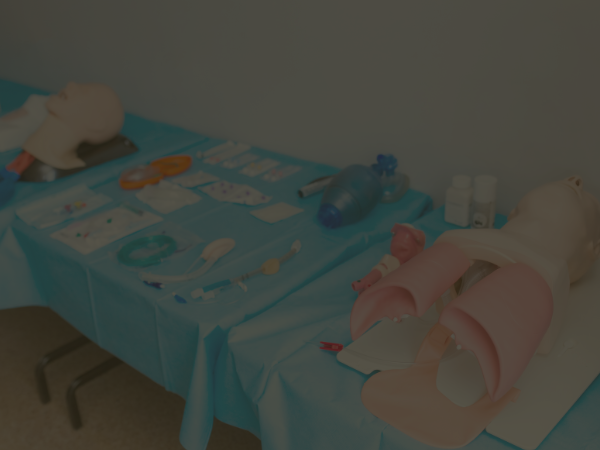PHILANTHROPY IS OFTEN ASSOCIATED WITH SPREADING WEALTH TO THE POOR AND PROBLEM -AFFECTED AREAS IN THE WORLD, but you do not have to be financially wealthy to be a philanthropist. There is great wealth in knowledge and helping others, and you have the opportunity to share that wealth with the rest of humanity.
The Disque Foundation will be traveling on a philanthropic mission in January 2018 to Nairobi, Kenya for 10 days. The Foundation will join forces with the Foundation for International Cardiac & Children’s Services (FICCS) to bring life-saving health care and emergent medical procedures to areas of the world that lack access to health care.
 The Disque Foundation, including a team from the AMC and NHCPS family, will be present, helping FICCS empower “superusers,” including nurses, medical students and volunteers, through education and training of CPR, ACLS and AED skills.
The Disque Foundation, including a team from the AMC and NHCPS family, will be present, helping FICCS empower “superusers,” including nurses, medical students and volunteers, through education and training of CPR, ACLS and AED skills.
This mission of mercy and hope is among our favorite events and times, and we hope that you consider following our example to be a beacon of hope and health care in the world. If so, follow these steps to help you prepare for philanthropy abroad.
1. Choose a Cause and Destination, and Get Your Passport
This is the most basic aspects to planning a trip to help other people around the globe. Choose your cause and destination first. This helps you start planning and helps you insure all subsequent steps for preparing for philanthropy abroad are suited for the destination. If you are unsure where to start, consider joining forces with the FICCS or the United Nations Foundation. Also, remember to start the process of applying for a passport at least three months before departure.
2. Make Long-Term Preparations for Your Home, Animals or Other Responsibilities
Before you can help other people, you need to make sure your responsibilities at home and at work are addressed. Arrange for someone to care for your home, lawn, and pets, if necessary. It may also be prudent to consider having a family member or friend board your pet temporarily while you are traveling. This helps prevent the development of neurotic or self-destructive behaviors in animal companions.
You may also consider a house sitter, which can help protect your belongings and reduce the risk of burglary or theft while traveling. Most importantly, understand that things don’t always go according to plan. A planned, six-week trip may evolve into a three-month opportunity to help other people if a disaster or major event occurs. Therefore, make short-term and long-term plans that can be adjusted based on what happens while traveling.
3. Select or Purchase an Appropriate Wardrobe
When planning to help other people and engage in philanthropy work, having a wardrobe might seem like an unnecessary expense. However, climates around the world are not necessarily going to work well with your existing wardrobe. Before traveling abroad, research the typical climate conditions of the areas you will be visiting. Search for clothing items that are appropriate for the area of where you will be traveling, and purchase items in advance. Also, consider cultural factors that may affect wardrobe choices. Certain garments and attire may be perceived as offensive to some cultures, so tailor your wardrobe selections appropriately.
4. Update Your Vaccinations, and Verify immunity Via Titered Blood Draws Prior to Departure
When traveling to underdeveloped areas of the world, as well as developed areas, you may come into contact with health illnesses that are practically nonexistent or well-controlled in the United States. Mosquito-borne illnesses may be rampant, and drinking water could be contaminated. It is much easier to contract an illness, such as hepatitis B, Salmonella or Norovirus, is public water systems around the globe, especially those with a documented history of being the source for major health outbreaks, says the Centers for Disease Control and Prevention (CDC).
To help your body prepare to fight off these potential infections, update your vaccinations before engaging in philanthropic work around the globe, advises the CDC. Depending on your existing insurance carrier, you may also qualify to receive common vaccines at little to no cost to you, and national pharmacy chains, such as Walgreens, are often able to accept health insurance for vaccination.
If you are uncertain about which vaccines are necessary for your planned travel destinations, the pharmacists may be able to help as well. In fact, you can begin your philanthropic work by choosing a pharmacy with a reputation for philanthropic work around the globe, so you may consider taking advantage of Walgreens’ “Get a Shot. Give a Shot. ®,” program. When you get a vaccination at Walgreens, a portion of the sale is donated to the United Nations Foundation is to help children get life-saving vaccines around the globe, particularly in poor and underdeveloped countries.
Of course, pharmacist recommendations are no substitute for the recommendations of your primary care physician (PCP). In addition, verify immunity with a blood titer, but that can be achieved during your international travel wellness exam.
5. Get an International Travel Wellness Exam
An updated immunization list is great, but how do you know you are actually healthy enough to travel abroad? The answer is simple; you need an International Travel Wellness Exam.
This exam reviews your complete health history and current health information to ensure you will not suffer any adverse health effects from international travel. Such exams will thoroughly review the current functionality of your major bodily systems, including your cardiovascular system, the respiratory system, the endocrine system and your gastrointestinal system. While individual PCPs may not offer a standard international travel wellness exam, most will be able to conduct an exam that reviews all necessary factors prior to international travel. In most cases, these means be as simple as a complete physical. Furthermore, your PCP will likely order a series of blood work to ensure you are as healthy as possible prior to travel.
6. Contact Your Cell Phone Carrier About Your Planned Travel
It is almost impossible to go about daily life without access to your cell phone, and while most smartphones have the ability to function on the cell phone towers of countries around the globe, that does not mean it will work automatically. Furthermore, failure to understand the potential ramifications for using your cell phone abroad could easily result in excessive surcharges and extreme roaming fees by your cell phone carrier. However, you can avoid this problem by following a few tips, as explained by the Huffington Post.
- Review your carrier’s options for international talk, text and data plans. Some carriers may offer plans designed for long-duration trips abroad, and other plans may work on a pay-as-you-go basis. If your planned philanthropic work is relatively short, it may be best to avoid using your cell phone as much as possible and sticking with the pay-as-you-go plan.
- Determine if your phone is compatible with destination power systems. Standard U.S. plugs may not work in other countries, and outlive voltage may vary widely as well. Before traveling abroad, make sure you have a phone that is compatible with the power outputs of your destination. If not, you may need to purchase a converter or adapter to charge your phone while abroad. Such converters are often inexpensive and widely available on Amazon and through major retailers.
- Turn off data usage. Data is among the top costs when using your cell phone abroad. If it is not necessary, turn off the data usage on your phone by visiting your settings and following the manufacturer’s instructions for disabling data.
- Download free messaging platforms. Free messaging platforms, such as Facebook messenger or Google Hangouts, may allow you to make and receive phone calls and text messages while traveling abroad at a discounted rate. However, you will need access to data connectivity, so be sure to check with your carrier before using such applications abroad.
- Connect free Wi-Fi hotspots. Depending on where you’re traveling, you may be able to access free Wi-Fi hotspots, which can be used to communicate through free platforms and use the Internet while traveling.
- Consider purchasing a prepaid phone and service for travel-specific use. This may seem like an extreme option, but it is often the easiest and most effective way of ensuring you are not hit with a surprise bill after spending weeks or months working in other countries.
7. Purchase Airfare and Travel Insurance
Upon completion of previous steps, you can begin the process of selecting your method of travel and searching for the best deals possible. As explained by Kim Komando of USA Today, there is not a perfect time of the week to search for the best airfare. However, online travel services can help you select the appropriate means of traveling to your destination for philanthropic work. Well-known sites, such as Travelocity and Airfarewatchdog, are excellent sites for finding the best deals.
If you have not previously traveled abroad, it can be difficult to figure out the quality of your travel, not just the costs. The cheapest option is not always the best, and if you are stuck in a cramped seat, you are more likely to be irritable, angry or even hostile upon arrival. This is no way to greet people suffering from different problems and issues. As a result, it is important to consider all factors affecting a particular flight.
Google Flights is among the easiest websites to use to thoroughly assess the cost and quality of airfare travel. Google assesses departure times, arrival times, past traveler experiences, average seating space, benefits and insurance offerings for each insurance offerings for airlines around the globe. In addition, you can set specific search parameters if Google Flights is unable if Google Flights is unable to fulfill your needs.
8. Avoid Risky Behaviors Prior to Departing
The last thing you want to happen when planning for a trip to help other people abroad is an illness, and certain illnesses, such as sexually-transmitted infections (STIs) and sexually transmitted diseases (STDs), can have extensive incubation periods. This means you could contract an illness and not realize it prior to traveling.
The solution to this risk lies in avoiding risky behaviors in the weeks leading up to your departure. Use appropriate protective barriers when engaging in sexual activity, and avoid drinking alcohol in excess. Engaging in excessive alcohol use or abusing any recreational drugs may impair judgment and result in additional risky behaviors. Even in areas where recreational substances may be legal, remember your plan to go help other people.
If you do engage in behaviors that increase risk of unsafe sexual practices or other activities that may cause harm, including driving under the influence or while intoxicated, your opportunities for traveling abroad and being part of a solution to global strife will decrease.
It is also a good idea to have an additional screening for any potential infections or major illnesses within seven days of your departure. Although you will have completed an initial international travel health screening much further in advance, an onset of illness may occur. If you live with any chronic diseases or illnesses, such as diabetes, chronic obstructive pulmonary disease (COPD), heart disease or gastrointestinal illnesses, check for any CDC Travel Health Notices prior to departure as well.
It is better to delay your plans and get the appropriate medical care necessary first. This helps you avoid potential problems with international travel and serve those in need to the best of your ability.
9. Complete Basic Training Courses, Like CPR, First Aid and Emergency Preparedness for Your Organization
Depending on where you choose to make a difference, the needs of people may vary from education to health care. Even if you do not have a background in healthcare, knowing how to provide basic services, like CPR, first aid and using an AED, can literally mean the difference between life and death.
Before departing on your trip to help those suffering, take time to complete all necessary training courses. This will ensure the greatest impact on people in war-affected regions, the suffering from lack of food and basic health care services and give you an opportunity to be part of a lasting solution.
Get Started Now, and Go Make a Difference in the World!
 Turmoil and despair exist around the globe, but there is light at the end of the proverbial tunnel. Through compassion, caring, a sense of humanity and unification, people can make a difference in the lives of those less fortunate. You can be a philanthropist by bringing aid to those in need, stop wasting time. Get started with your plans for making a difference abroad. If you have not already done so, sign up for an online CPR, AED and First Aid certification course, and you will be one step closer to being a positive light in the world.
Turmoil and despair exist around the globe, but there is light at the end of the proverbial tunnel. Through compassion, caring, a sense of humanity and unification, people can make a difference in the lives of those less fortunate. You can be a philanthropist by bringing aid to those in need, stop wasting time. Get started with your plans for making a difference abroad. If you have not already done so, sign up for an online CPR, AED and First Aid certification course, and you will be one step closer to being a positive light in the world.







Leave a Reply